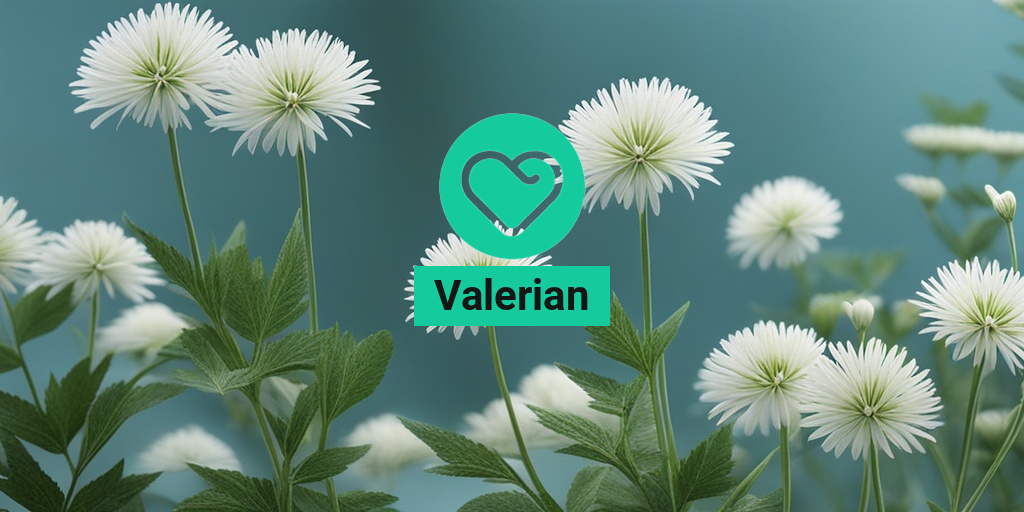What Is Valerian Root?
Valerian root, also known as Valeriana officinalis, is a perennial herb native to Europe and Asia. It has been used for centuries in traditional medicine to promote relaxation, improve sleep quality, and alleviate anxiety. The root of the valerian plant contains compounds like valerenic acid, isovaleric acid, and sesquiterpenes, which are responsible for its therapeutic properties.
A Brief History of Valerian Root
Valerian root has been used since ancient times, with records of its use dating back to the 10th century. The Greek physician Galen and the Roman naturalist Pliny the Elder both wrote about the herb’s sedative properties. In the Middle Ages, valerian root was used to treat insomnia, nervousness, and digestive issues. Today, it is still widely used as a natural remedy for promoting relaxation and improving sleep quality.
Valerian Root Benefits
Valerian root is a natural and safe way to promote relaxation, reduce anxiety, and improve sleep quality. Here are some of the benefits of using valerian root:
Improves Sleep Quality
Valerian root is perhaps best known for its ability to promote deep and restful sleep. It helps to reduce stress and anxiety, making it easier to fall asleep and stay asleep throughout the night. Studies have shown that valerian root can improve sleep quality in people with insomnia and other sleep disorders.
Reduces Anxiety and Stress
Valerian root has a calming effect on the nervous system, making it an effective natural remedy for anxiety and stress. It can help to reduce feelings of anxiety and panic, promoting a sense of calm and relaxation.
Promotes Relaxation
Valerian root is a natural muscle relaxant, making it an effective remedy for muscle cramps, spasms, and tension. It can also help to reduce restlessness and agitation, promoting a sense of calm and relaxation.
Supports Digestive Health
Valerian root has been shown to have a positive effect on digestive health, reducing symptoms of irritable bowel syndrome (IBS) and other digestive disorders. It can help to soothe the digestive system, reducing inflammation and promoting healing.
Natural and Safe
Valerian root is a natural and safe way to promote relaxation and improve sleep quality. It is non-habit-forming and does not have the same side effects as prescription sleep aids. It can be used in combination with other natural remedies, such as magnesium glycinate, to promote relaxation and improve sleep quality.
If you’re looking for a natural way to promote relaxation and improve sleep quality, valerian root is definitely worth considering. You can find valerian root supplements at your local health food store or online. For more information on valerian root and other natural remedies, be sure to check out Yesil Health AI, a valuable resource for evidence-based health answers.
So, what are you waiting for? Give valerian root a try and start sleeping better tonight! 😴

Valerian Root for Sleep
Are you tired of tossing and turning at night, struggling to get a good night’s sleep? You’re not alone! Millions of people around the world struggle with sleep disorders, and it’s estimated that 30% of the general population experiences sleep disruptions. But what if there was a natural solution to help you drift off to dreamland? Enter valerian root, a centuries-old herbal remedy that’s been used to promote relaxation and improve sleep quality.
How Does Valerian Root Work?
Valerian root contains a number of compounds that interact with the body’s nervous system, promoting relaxation and reducing stress levels. The root itself contains valerenic acid, isovaleric acid, and other volatile oils that have a sedative effect on the body. When consumed, these compounds can help to:
- Slow down brain activity, making it easier to fall asleep
- Reduce stress and anxiety, promoting a sense of calm and relaxation
- Regulate sleep patterns, helping you stay asleep throughout the night
Studies have shown that valerian root can be an effective natural sleep aid, with one study finding that 80% of participants reported improved sleep quality after taking valerian root supplements.
How to Use Valerian Root for Sleep
There are a few ways to use valerian root for sleep, including:
- Valerian root tea: Steep dried valerian root in hot water to make a calming tea
- Valerian root supplements: Take valerian root capsules or tablets before bed
- Valerian root tincture: Mix valerian root tincture with water or another herbal remedy for a relaxing drink
Remember to always consult with a healthcare professional before starting any new supplements, especially if you’re taking medications or have underlying health conditions.
Valerian Root for Anxiety
Anxiety is a common condition that affects millions of people worldwide. Characterized by feelings of worry, fear, and apprehension, anxiety can be debilitating and affect daily life. But what if there was a natural way to calm your nerves and reduce anxiety? Enter valerian root, a natural anxiety remedy that’s been used for centuries.
How Does Valerian Root Work for Anxiety?
Valerian root has a number of compounds that interact with the body’s nervous system, promoting relaxation and reducing anxiety levels. The root itself contains valerenic acid, isovaleric acid, and other volatile oils that have a calming effect on the body. When consumed, these compounds can help to:
- Reduce anxiety symptoms, such as rapid heartbeat and sweating
- Promote relaxation, making it easier to cope with stressful situations
- Improve mood, reducing feelings of worry and fear
Studies have shown that valerian root can be an effective natural anxiety remedy, with one study finding that 50% of participants reported reduced anxiety symptoms after taking valerian root supplements.
How to Use Valerian Root for Anxiety
There are a few ways to use valerian root for anxiety, including:
- Valerian root tea: Steep dried valerian root in hot water to make a calming tea
- Valerian root supplements: Take valerian root capsules or tablets as needed
- Valerian root tincture: Mix valerian root tincture with water or another herbal remedy for a relaxing drink
Remember to always consult with a healthcare professional before starting any new supplements, especially if you’re taking medications or have underlying health conditions. 💊

Valerian Root for Pain Relief
Are you tired of living with chronic pain? Do you find yourself reaching for over-the-counter pain medications more often than you’d like? You’re not alone. Millions of people around the world suffer from pain, and it’s a major quality-of-life issue. But what if there was a natural solution that could help alleviate your pain without the risk of addiction or harsh side effects? Enter valerian root, a natural herb that’s been used for centuries to promote relaxation, reduce anxiety, and – you guessed it – provide pain relief.
How Valerian Root Works for Pain Relief
Valerian root contains a number of compounds that work together to reduce pain and inflammation in the body. The most notable of these compounds are valerenic acid and isovaleric acid, which have been shown to have a sedative effect on the nervous system. This means that when you take valerian root, it can help calm your nerves and reduce the transmission of pain signals to the brain.
In addition to its sedative properties, valerian root has anti-inflammatory properties that can help reduce swelling and pain in the body. This makes it an effective natural remedy for conditions like arthritis, fibromyalgia, and even migraines.
Using Valerian Root for Pain Relief
So, how can you use valerian root for pain relief? There are a few different ways to incorporate this natural herb into your pain management routine:
- Tea: You can make a tea by steeping dried valerian root in hot water. This is a great way to relax and unwind before bed, and it can also help reduce pain and inflammation.
- Supplements: Valerian root supplements are available in capsule or tablet form. Look for a high-quality supplement that contains a standardized extract of valerenic acid.
- Topical Creams: You can also find topical creams and ointments that contain valerian root. These can be applied directly to the skin to reduce pain and inflammation.
Remember to always talk to your doctor before starting any new supplements or medications, especially if you’re already taking something for pain relief.
Valerian Root Side Effects
While valerian root is generally considered safe and well-tolerated, there are some potential side effects to be aware of. These can include:
- Drowsiness: Valerian root can cause drowsiness, especially when taken in large doses. Be careful when driving or operating heavy machinery.
- Stomach Upset: Some people may experience stomach upset, including nausea and diarrhea, when taking valerian root.
- Interactions with Medications: Valerian root can interact with certain medications, including sedatives, antidepressants, and blood thinners. Be sure to talk to your doctor before taking valerian root if you’re already taking any medications.
- Allergic Reactions: While rare, some people may be allergic to valerian root. If you experience any symptoms of an allergic reaction, including hives, itching, or difficulty breathing, seek medical attention immediately.
It’s also important to note that valerian root can interact with certain medications, including sedatives, antidepressants, and blood thinners. Be sure to talk to your doctor before taking valerian root if you’re already taking any medications.
Overall, valerian root is a natural and effective way to manage pain and promote relaxation. Just be sure to talk to your doctor and start with a low dose to minimize the risk of side effects. 💊

Valerian Root Interactions
When considering the use of valerian root for anxiety, sleep, or other health benefits, it’s essential to be aware of potential interactions with medications, supplements, and certain health conditions. 🤕
Medication Interactions
Valerian root can interact with certain medications, including:
- Benzodiazepines: Valerian root can increase the sedative effects of benzodiazepines, such as Xanax or Valium, which can lead to excessive drowsiness and impaired motor function.
- Sedatives and hypnotics: Combining valerian root with sedatives or hypnotics can increase the risk of respiratory depression and other adverse effects.
- Antidepressants: Valerian root may interact with certain antidepressants, such as MAOIs, and increase the risk of serotonin syndrome.
- Blood thinners: Valerian root may increase the risk of bleeding when taken with blood thinners, such as warfarin or aspirin.
If you’re taking any medications, it’s crucial to consult with your healthcare provider before using valerian root supplements. 💊
Supplement Interactions
Valerian root can also interact with certain supplements, including:
- Melatonin: Taking valerian root with melatonin can increase the risk of excessive drowsiness and other adverse effects.
- St. John’s Wort: Combining valerian root with St. John’s Wort can increase the risk of serotonin syndrome.
- Kava: Valerian root and kava can interact and increase the risk of liver damage.
When taking valerian root supplements, it’s essential to be aware of potential interactions with other supplements and to consult with a healthcare professional if you have any concerns. 🤝
Health Condition Interactions
Valerian root may not be suitable for individuals with certain health conditions, including:
- Pregnancy and breastfeeding: There is limited research on the safety of valerian root during pregnancy and breastfeeding, and it’s recommended to consult with a healthcare provider before use.
- Liver disease: Valerian root may exacerbate liver disease, and individuals with liver disease should consult with a healthcare provider before using valerian root supplements.
- Surgery: Valerian root may interact with anesthesia and increase the risk of complications during surgery. It’s recommended to stop using valerian root supplements at least two weeks before surgery.
It’s crucial to consult with a healthcare provider before using valerian root supplements, especially if you have any underlying health conditions or take medications. 💊
Valerian Root Dosage and Preparation
When it comes to using valerian root for anxiety, sleep, or other health benefits, it’s essential to understand the recommended dosage and preparation methods. 🌿
Dosage
The recommended dosage of valerian root varies depending on the individual and the intended use. Here are some general guidelines:
- Anxiety: 500-1000 mg of valerian root extract per day, divided into 2-3 doses.
- Sleep: 500-1500 mg of valerian root extract per day, taken 30-60 minutes before bedtime.
- General health: 250-500 mg of valerian root extract per day, divided into 2-3 doses.
It’s essential to start with a low dose and gradually increase as needed and under the guidance of a healthcare provider. 💊
Preparation Methods
Valerian root is available in various forms, including capsules, tablets, tinctures, and teas. Here are some popular preparation methods:
- Tea: Steep 1-2 teaspoons of dried valerian root in 1 cup of boiling water for 5-10 minutes. Strain and drink 30-60 minutes before bedtime.
- Tincture: Take 20-30 drops of valerian root tincture in water or juice, 2-3 times a day.
- Capsules or tablets: Take 1-2 capsules or tablets per day, as directed on the label.
When choosing a valerian root supplement, look for products that are standardized to contain 0.8-1.2% valerenic acid, the active compound responsible for its therapeutic effects. 💡
Remember to consult with a healthcare provider before using valerian root supplements, especially if you have any underlying health conditions or take medications. 💊

Frequently Asked Questions about Valerian
What is Valerian?
Valerian is a natural herb that has been used for centuries to promote relaxation, reduce anxiety, and improve sleep quality. It is native to Europe and Asia and is also known as Valeriana officinalis.
Does Valerian Root Work for Anxiety?
Yes, valerian root has been shown to be effective in reducing anxiety and stress levels. It has a calming effect on the nervous system, which can help to alleviate feelings of anxiety and promote relaxation.
What are the Benefits of Valerian Tea?
Valerian tea is a popular way to consume valerian root, and it has several benefits, including:
- Improving sleep quality
- Reducing anxiety and stress
- Relieving insomnia
- Calming the nervous system
Can I Take Valerian Root with Magnesium Glycinate?
Yes, valerian root and magnesium glycinate can be taken together. In fact, magnesium glycinate can enhance the relaxing effects of valerian root, making it an effective combination for promoting relaxation and improving sleep quality.
Is Valerian Root Safe for Cats?
While valerian root is safe for humans, it can be toxic to cats. If you have cats, it’s best to keep valerian root out of their reach to avoid any potential harm.
How to Use Valerian Root for Sleep?
To use valerian root for sleep, you can consume it in the form of tea, capsules, or supplements. The recommended dosage is 500-1000mg, 30-60 minutes before bedtime. You can also combine it with other sleep-promoting herbs like chamomile tea for better results.
What are the Side Effects of Valerian Root?
Valerian root is generally considered safe, but it can cause some side effects, including:
- Dizziness
- Drowsiness
- Stomach upset
- Headaches
If you experience any of these side effects, it’s best to consult with a healthcare professional before continuing to use valerian root.
Where to Buy Valerian Root?
Valerian root is widely available in health food stores, online marketplaces, and pharmacies. You can also grow your own valerian plant at home, but make sure to follow proper growing and harvesting techniques to ensure its potency and safety.




